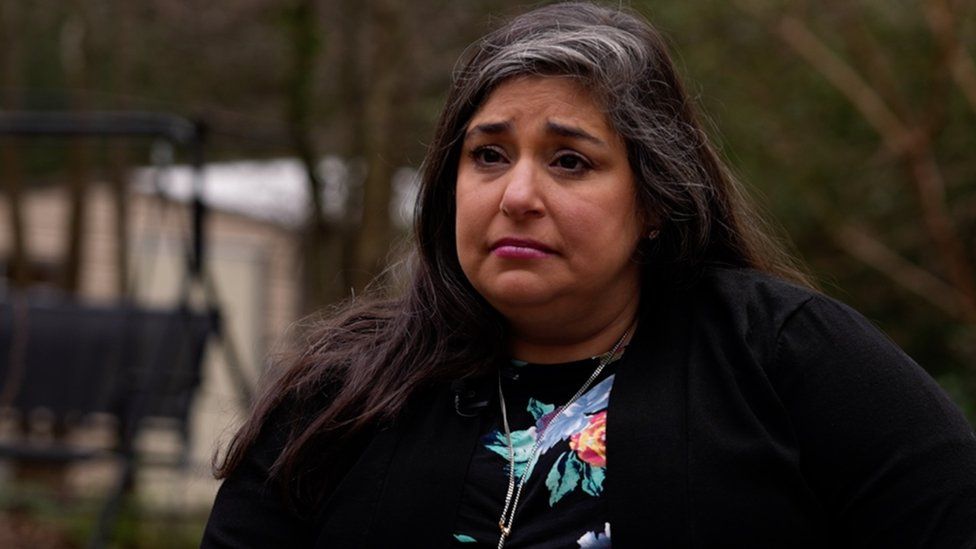Alabama clinics pause IVF treatments after frozen embryo ruling
- Published

Medical providers and fertility patients in Alabama have been left in uncertainty after a court ruled that frozen embryos are considered children.
At least three fertility facilities have since paused new IVF treatments over concerns of "legal risk".
"There is an emotional side to this, and I don't think the law should be based on those emotions," one Alabama mother said.
The ruling opens up a new front in the US battle over reproductive medicine.
It is not yet clear what the impact might be in other parts of the country.
The Alabama Supreme Court ruling, which came down on Friday, was prompted by three couples who filed a case after their embryos were accidentally destroyed in an incident in 2020.
A patient wandered into the part of a fertility clinic where the embryos being stored, handled them, and accidentally dropped them.
The ruling did not ban or restrict IVF and in fact, the couples who brought the case actively sought out the procedure.
But experts say the decision may cause confusion about whether some aspects of IVF are legal under Alabama law - and over how to use and store embryos.
President Joe Biden weighed in on Alabama's decision, saying it puts "some fertility treatments at risk for families who are desperately trying to get pregnant".
"The disregard for women's ability to make these decisions for themselves and their families is outrageous and unacceptable," he said in a statement. "This is a direct result of the overturning of Roe v Wade."
Alabama Fertility, the largest clinic in the state, announced in a Facebook post on Thursday its "impossibly difficult decision to hold new IVF treatments due to the legal risk to our clinic and our embryologists".
It said it was contacting affected patients "to find solutions", and would alert legislators "as to the far reaching negative impact of this ruling on the women of Alabama".
Another clinic, Mobile Infirmary, announced it would be pausing treatments as well, saying the court decision "sadly left us with no choice".
"We understand the burden this places on deserving families who want to bring babies into this world and who have no alternative options for conceiving," said Mark Nix, president and of Infirmary Health.
It comes after the southern US state's largest hospital stated on Wednesday its own decision to pause IVF services, over fears it could be exposed to criminal prosecution.
Dr Mamie McLean from Alabama Fertility told the BBC World Service Newshour programme that her patients would not be able to go through IVF in the near future.
She said the court ruling made it "impossible" for IVF treatments to happen in the state, adding that "there will be fewer babies in Alabama because of this". She pointed out that Alabama already had one of the lowest net population growths in the nation.
Dr McLean explained: "If an embryo is considered a child, the legal ramifications are too far-reaching and scary. We cannot put our practice or our embryology team at the risk of significant legal penalty or even jail time. And unfortunately, our patients are bearing the burden of this misguided ruling."
IVF patients are also concerned about the ruling's ramifications.
Veronica Wehby-Upchurch, 42, told the BBC that she had her son - now three years old - via IVF and has two frozen embryos in the state.
Since the ruling, though, she fears prosecution.
Because she already went through IVF before, she says that while she was "appalled" at the news, she was "unfortunately, not shocked", adding that "those of us who have been paying attention sort of saw this coming".
Ms Wehby-Upchurch says her desire is to have another child but she does not know now what her options are and, at 42, there's not a lot of time left.
"I understand the idea of attaching emotions to embryos," she said. "But you can't cuddle an embryo, you can't breastfeed an embryo. It took me five embryos to get to my one child I hold in my arms."
IVF - which stands for in-vitro fertilisation - offers a possible solution to women who face challenges getting pregnant. Officials say around 2% of US pregnancies are the result of this method.
The process involves retrieving the woman's eggs with a needle from her ovaries and combining them with a man's sperm in a lab. The fertilised embryo is then transferred into the woman's uterus, where it may create a pregnancy.
- Published5 days ago